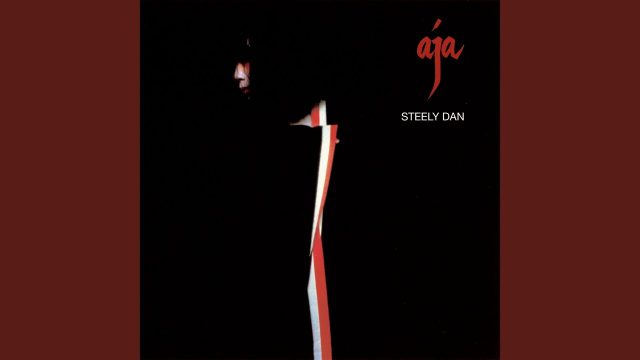In 1977, the musical world at large finally caught up with Steely Dan. Up until that point, the collaborative songwriting duo of Donald Fagen and Walter Becker, assisted by a coterie of highly-paid studio musicians, had thrown a great many listeners off of their trail with harmonically-sophisticated riffs borrowed from their favorite jazz albums and lyrics that rifled through several decades of slang (some of it invented on the spot).
With Aja, which became a bestseller, the challenges Fagen and Becker came up with for listeners were easier to handle. The top-notch singles, “Peg,” “Josie,” and “Deacon Blues,” were enveloped in the blues-drenched mood of the album, drawing the curtains against the overheated sunshine pop of the 70s. Shaped by Fagen and Becker’s pose of worldly detachment and insatiable lust for studio perfection, Aja may have appealed to both the coke-numbed LA demimonde and an ever-growing legion of audiophiles (the album has long been a stereo-demonstration favorite). Yet, on this record, Fagen and Becker got to where they were going on their own radically-formalist terms—even if, as it turns out, they couldn’t stay there for very long.
With the blues form especially, they took its ironic potential to delicious heights, starting with the direct and dryly funny “Black Cow.” The narrator first treats his woman’s offenses with the utmost gravity. “You were high,” he complains, while the band leans into a syncopated chord change. There’s a twist to this love story: in the chorus, the narrator can only hope that she will take the initiative and leave him, as the drums let loose to punctuate his heartbreak, “Drink your big black cow and get out of here.”
Following is the title track, a hazy, alchemical (or maybe just chemical) romance. Clocking in at eight minutes, it’s wildly ambitious, yet never wears out its welcome. The terse, cryptic wordplay (“Double helix in the sky tonight”) builds a narrative tension that is released in two ecstatic sections of brilliant jazz soloing, led by Wayne Shorter on tenor sax and Steve Gadd on drums.
A different kind of fantasy is conveyed through the drifting guitar chords of “Deacon Blues.” The narrator distantly contemplates the stereotypical appeal of a musician’s life: indiscriminate affairs and gigs lasting into the wee hours. A shift to a minor tonality anticipates his thoughts about going out like one of the greats: “Drink scotch whiskey all night long/And die behind the wheel.” Yet, upon the reveal that this fantasy is being dreamed up in the suburbs, there’s an unmistakable ring of truth when it comes to the aspirations of Fagen and Becker as adolescents—Fagen would build his first solo album around his teenage dreams of living a life on the margins of pop culture.
The blues, of course, is about how far you can fall, and the repetitive groove of “Peg” counterpoints the predicament of an aspiring starlet who ends up in the lower echelons of the porn industry (coded in the slang of making a “foreign movie”). Another look at dissipation, “Josie,” also grooves hard, but is tinged with religious ecstasy: “She prays like a Roman with her eyes on fire.” We get a comic description of the party, to end all parties, being planned for the arrival of this seemingly wild woman, but still are left to wonder if it’s all in the heads of the gathering crowd.
While “Josie” closes the album on a vaguely apocalyptic note, the real showstopper is “Home At Last,” an updated version—staged on a super highway—of The Odyssey. At first, needling, “You think you’ve heard this one before,” the narrator proceeds to deliver a stoic statement about life on the run:
Well the danger on the rocks is surely past
Still I remain tied to the mast
Could it be that I have found my home at last
Home at last
This intricate transition, of which the first few seconds reportedly burned a ridiculous amount of studio time to mix, segues into an instrumental break full of further surprises. Fagen plays a menacingly sideways synthesizer solo, before handing it off to Becker, whose guitar makes dazzling runs over the restless pulse of the rhythm section.
Reading the sarcastic, self-penned liner notes (written under a pseudonym), you get the feeling that Fagen and Becker were aware of the market value of their labor, although their jivey promotion of “Josie” as a “sociopathic jump tune” mocked the hard sell.
But it wouldn’t be nearly as easy the next time, nor would there be anything like the sense of a resolution after “Josie” ended the nearly-perfect Aja—only “I Got the News,” a rhythmic workout in need of editing, fails to reach the lofty standards set by the other six songs. Released three years later, Gaucho (1980) had more than its share of problems, including the accidental erasure (!) of the song intended to be the album’s centerpiece and Becker’s being zonked on heroin, forcing Fagen to take over as producer, a role better suited for Becker. For reasons, which I hope to elaborate upon at a future date, Gaucho is my favorite, but, as practically any Dan fan will tell you, Aja is truly Fagen and Becker’s best work.


